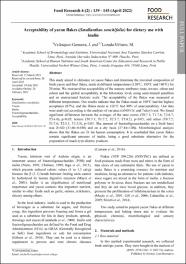Acceptability of yacon flakes (Smallanthus sonchifolia) for dietary use with inulin

View/
Download
(application/pdf: 471.3Kb)
(application/pdf: 471.3Kb)
Date
2022-04-28Author(s)
Velásquez-Gamarra, J.
Lozada-Urbano, M.
Metadata
Show full item recordAbstract
“This study aimed to elaborate on yacon flakes and determine the proximal composition of
fresh yacon and final flakes, made at different temperatures (120°C, 150°C and 180°C) for
20 mins. We measured the acceptability of the sensory attributes: taste, texture, odour and
colour and the global acceptability at the laboratory level, using semi-trained panellists
and an unstructured hedonic scale. The acceptability of the flakes was measured at
different temperatures. Our results indicate that the flakes made at 180°C had the highest
acceptance (87%), and the flakes made at 120°C had 80% of unacceptability. Our data
were analysed according to the analysis of variance (ANOVA) and Tukey's test. We found
significant differences between the averages of the taste scores (T0:7.1; T1:7.6; T2:6.7;
T3:4.6), p<0.05; texture (T0:7.1; T1:7.2; T2:5.7; T3:4.5), p<0.05; and odour (T0:7.2;
T1:7.6; T2:5.1; T3:3.3), p<0.05. The amount of fructooligosaccharides on a fresh basis
was Ⱦ±SD (31.60±0.650) and on a dry basis (37.44±1DS). Microbiological analysis
shows that the flakes are fit for human consumption. It is concluded that yacon flakes
contain significant amounts of inulin, being a good substitute alternative for the
preparation of snack-type dietetic products“
Collections
- SCOPUS [380]

